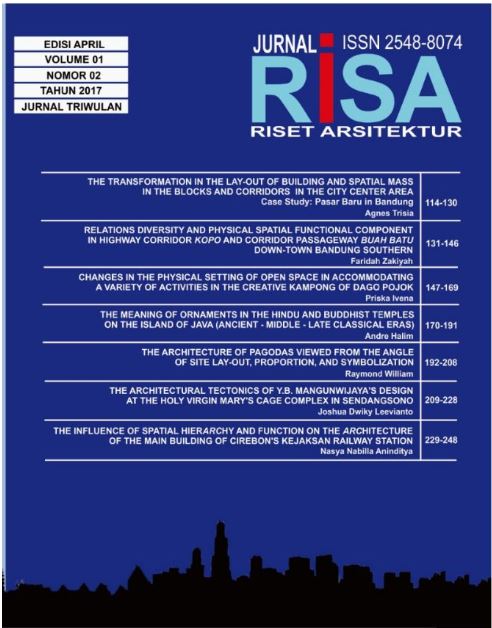THE INFLUENCE OF SPATIAL HIERARCHY AND FUNCTION ON THE ARCHITECTURE OF THE MAIN BUILDING OF CIREBON’S KEJAKSAN RAILWAY STATION
DOI:
https://doi.org/10.26593/risa.v1i02.2394.229-248Abstrak
Abstract - The Cirebon region was once one of the centers for sugar plantations on Java. In the middle of the 19th century the town of Cirebon developed an urban area revolving around the food industry whose main products were sugar and ice. To facilitate the distribution of sugar in large quantities, the State Railway Service built the Cirebon Railway Station in the Kejaksan town district. This was designed and built by a Dutch architect named P.A.J. Mooijen in 1911, in the typical “Indies” style that was in the middle phase of its development. This research study aims to explore the influence of function and hierarchy on its architectural form, namely the main station building on Jalan Siliwangi in the Kejaksan district. The research steps consist of deconstructing and classifying the building, employing Thijs Eversen’s theory concerning Archetypes in Architecture, and an examination of function, form, space and ordering principles as described by Francis D.K. Ching. The result of this interpretation is subsequently linked to various indicators that point toward the Indies style of architecture, as proposed by Hardinoto. The final step consists of showing the connection between spatial function and hierarchy found in the building form. The conclusion indicates that spatial function and hierarchy have indeed had a direct impact on the architectural form examined. This is discernible in the building mass that shows a formal hierarchy in the middle, which is in keeping with the hierarchy of building space. The typical Dutch East Indies building concept featuring the use of symmetrical space, a monumental shape due to the hierarchy in the middle section, and the use of supporting walls can all be found in the main building of this railway station.
Keywords: Function, Form, Space, Spatial Hierarchy, Dutch East Indies Style of Architecture












